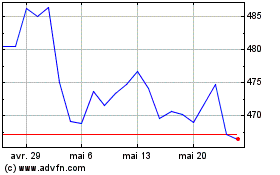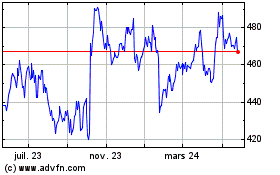GAO Turns Down Boeing Protest Over Bomber Contract -- Update
17 Février 2016 - 12:41AM
Dow Jones News
By Doug Cameron
Northrop Grumman Corp. can resume work on developing a new Air
Force bomber after a federal overseer on Tuesday rejected a protest
led by Boeing Co. on Northrop's contract for a program that could
ultimately cost more than $80 billion.
The ruling by the Government Accountability Office follows
Boeing's protest in November of an award that wound up one of the
fiercest bidding contests in more than a decade. Northrop had to
stop work on the classified program after Boeing and partner
Lockheed Martin Corp. alleged that the Air Force selection was
"irreparably flawed" because of its treatment of cost and
performance estimates submitted by the opposing bidders.
The GAO could have opted to reopen the bidding or amend the
existing contract, but soundly rejected the protest on Tuesday. The
Air Force and Northrop had previously stood behind the award
process.
"GAO reviewed the challenges to the selection decision raised by
Boeing and has found no basis to sustain or uphold the protest,"
the agency said.
"In denying Boeing's protest, GAO concluded that the technical
evaluation, and the evaluation of costs, was reasonable, consistent
with the terms of the solicitation, and in accordance with
procurement laws and regulations."
Boeing said that it would review the GAO's classified ruling and
then decide on its next steps. Options include taking the Pentagon
to court in an effort to reopen the bidding, analysts said.
The lack of big long-term military equipment deals in recent
years has made protests increasingly commonplace, though less than
a fifth are upheld by the GAO, a nonpartisan congressional
watchdog.
Northrop said last month that it had included some revenue from
work on the long-range strike bomber in its 2016 outlook, and
planned to increase hiring on the program, which has been under
development for several years.
The company was awarded a $21.4 billion deal in October to
complete the bomber's development alongside a contract to build an
initial 21 jets. The Pentagon didn't reveal the size of the
production deal, but wants eventually to field 100 of the jets to
replace aging aircraft such as the B-52, with the first aircraft
put into service in 2025. Analysts estimate the total cost of the
program at $80 billion.
The Pentagon's fiscal 2017 budget request last week included
$12.1 billion for research and development in the bomber program
over the next five years. Such requests typically take one to two
years to turn into revenue for contractors, and the Air Force
hasn't detailed Northrop Grumman's partners on the program.
The GAO's decision moves attention for now to the two next big
Air Force contracts expected to be awarded over the next two years,
including a fleet of new training jets and the JSTARS
reconnaissance plane.
The rejection of Boeing's protest also increases the importance
of securing more overseas orders for the company's existing combat
aircraft, including a potential deal to sell F/A18s to Kuwait and
F-15s to Qatar. The latest Pentagon budget did allocate funds for
more F/A-18s for the Navy.
Generally, most company protests of federal contract awards
involve concerns about the government's fairness in setting
requirements or implementing evaluation criteria.
The GAO received more than 2,500 protests in 2014, slightly more
than half of them involving Pentagon deals. The annual rate has
climbed 45% since 2008 when adjusted for lower government spending,
according to the Congressional Research Service.
Write to Doug Cameron at doug.cameron@wsj.com
(END) Dow Jones Newswires
February 16, 2016 18:26 ET (23:26 GMT)
Copyright (c) 2016 Dow Jones & Company, Inc.
Northrop Grumman (NYSE:NOC)
Graphique Historique de l'Action
De Juin 2024 à Juil 2024

Northrop Grumman (NYSE:NOC)
Graphique Historique de l'Action
De Juil 2023 à Juil 2024
